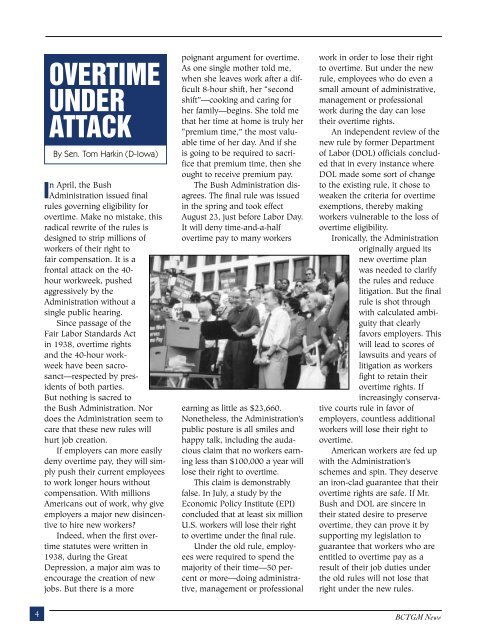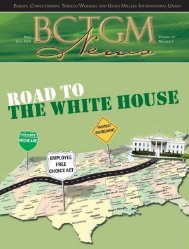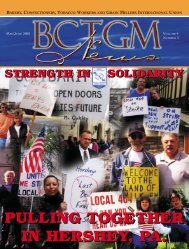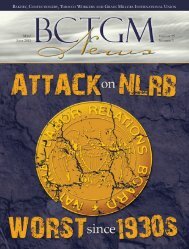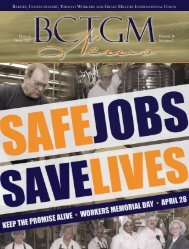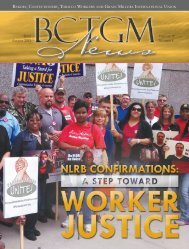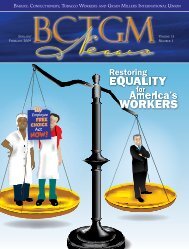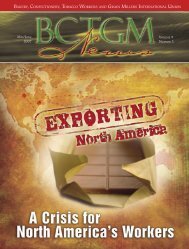to view/print. - Bakery, Confectionery, Tobacco Workers and Grain ...
to view/print. - Bakery, Confectionery, Tobacco Workers and Grain ...
to view/print. - Bakery, Confectionery, Tobacco Workers and Grain ...
Create successful ePaper yourself
Turn your PDF publications into a flip-book with our unique Google optimized e-Paper software.
OVERTIME<br />
UNDER<br />
ATTACK<br />
By Sen. Tom Harkin (D-Iowa)<br />
In April, the Bush<br />
Administration issued final<br />
rules governing eligibility for<br />
overtime. Make no mistake, this<br />
radical rewrite of the rules is<br />
designed <strong>to</strong> strip millions of<br />
workers of their right <strong>to</strong><br />
fair compensation. It is a<br />
frontal attack on the 40-<br />
hour workweek, pushed<br />
aggressively by the<br />
Administration without a<br />
single public hearing.<br />
Since passage of the<br />
Fair Labor St<strong>and</strong>ards Act<br />
in 1938, overtime rights<br />
<strong>and</strong> the 40-hour workweek<br />
have been sacrosanct—respected<br />
by presidents<br />
of both parties.<br />
But nothing is sacred <strong>to</strong><br />
the Bush Administration. Nor<br />
does the Administration seem <strong>to</strong><br />
care that these new rules will<br />
hurt job creation.<br />
If employers can more easily<br />
deny overtime pay, they will simply<br />
push their current employees<br />
<strong>to</strong> work longer hours without<br />
compensation. With millions<br />
Americans out of work, why give<br />
employers a major new disincentive<br />
<strong>to</strong> hire new workers?<br />
Indeed, when the first overtime<br />
statutes were written in<br />
1938, during the Great<br />
Depression, a major aim was <strong>to</strong><br />
encourage the creation of new<br />
jobs. But there is a more<br />
poignant argument for overtime.<br />
As one single mother <strong>to</strong>ld me,<br />
when she leaves work after a difficult<br />
8-hour shift, her “second<br />
shift”—cooking <strong>and</strong> caring for<br />
her family—begins. She <strong>to</strong>ld me<br />
that her time at home is truly her<br />
“premium time,” the most valuable<br />
time of her day. And if she<br />
is going <strong>to</strong> be required <strong>to</strong> sacrifice<br />
that premium time, then she<br />
ought <strong>to</strong> receive premium pay.<br />
The Bush Administration disagrees.<br />
The final rule was issued<br />
in the spring <strong>and</strong> <strong>to</strong>ok effect<br />
August 23, just before Labor Day.<br />
It will deny time-<strong>and</strong>-a-half<br />
overtime pay <strong>to</strong> many workers<br />
earning as little as $23,660.<br />
Nonetheless, the Administration’s<br />
public posture is all smiles <strong>and</strong><br />
happy talk, including the audacious<br />
claim that no workers earning<br />
less than $100,000 a year will<br />
lose their right <strong>to</strong> overtime.<br />
This claim is demonstrably<br />
false. In July, a study by the<br />
Economic Policy Institute (EPI)<br />
concluded that at least six million<br />
U.S. workers will lose their right<br />
<strong>to</strong> overtime under the final rule.<br />
Under the old rule, employees<br />
were required <strong>to</strong> spend the<br />
majority of their time—50 percent<br />
or more—doing administrative,<br />
management or professional<br />
work in order <strong>to</strong> lose their right<br />
<strong>to</strong> overtime. But under the new<br />
rule, employees who do even a<br />
small amount of administrative,<br />
management or professional<br />
work during the day can lose<br />
their overtime rights.<br />
An independent re<strong>view</strong> of the<br />
new rule by former Department<br />
of Labor (DOL) officials concluded<br />
that in every instance where<br />
DOL made some sort of change<br />
<strong>to</strong> the existing rule, it chose <strong>to</strong><br />
weaken the criteria for overtime<br />
exemptions, thereby making<br />
workers vulnerable <strong>to</strong> the loss of<br />
overtime eligibility.<br />
Ironically, the Administration<br />
originally argued its<br />
new overtime plan<br />
was needed <strong>to</strong> clarify<br />
the rules <strong>and</strong> reduce<br />
litigation. But the final<br />
rule is shot through<br />
with calculated ambiguity<br />
that clearly<br />
favors employers. This<br />
will lead <strong>to</strong> scores of<br />
lawsuits <strong>and</strong> years of<br />
litigation as workers<br />
fight <strong>to</strong> retain their<br />
overtime rights. If<br />
increasingly conservative<br />
courts rule in favor of<br />
employers, countless additional<br />
workers will lose their right <strong>to</strong><br />
overtime.<br />
American workers are fed up<br />
with the Administration’s<br />
schemes <strong>and</strong> spin. They deserve<br />
an iron-clad guarantee that their<br />
overtime rights are safe. If Mr.<br />
Bush <strong>and</strong> DOL are sincere in<br />
their stated desire <strong>to</strong> preserve<br />
overtime, they can prove it by<br />
supporting my legislation <strong>to</strong><br />
guarantee that workers who are<br />
entitled <strong>to</strong> overtime pay as a<br />
result of their job duties under<br />
the old rules will not lose that<br />
right under the new rules.<br />
4<br />
BCTGM News


